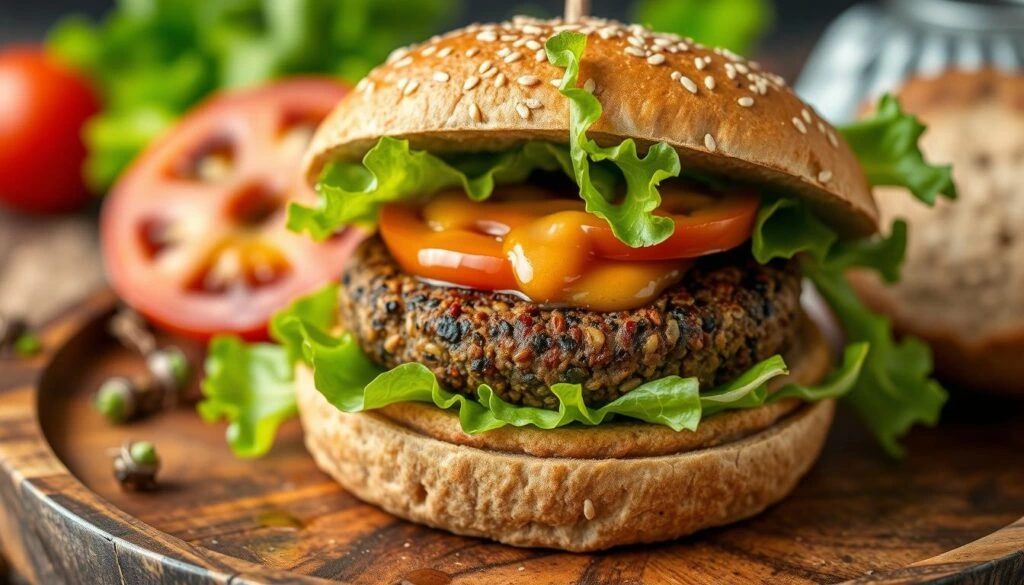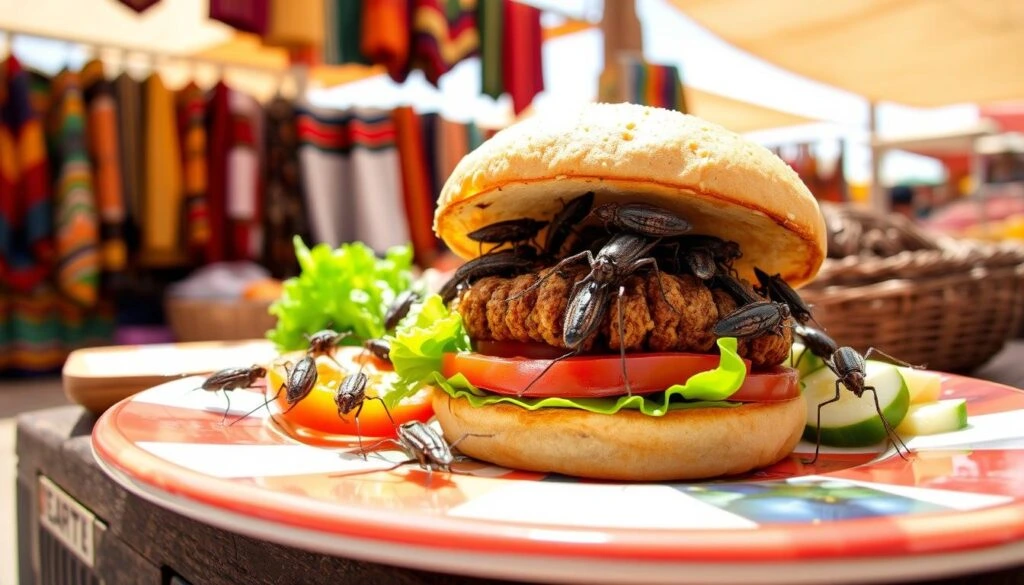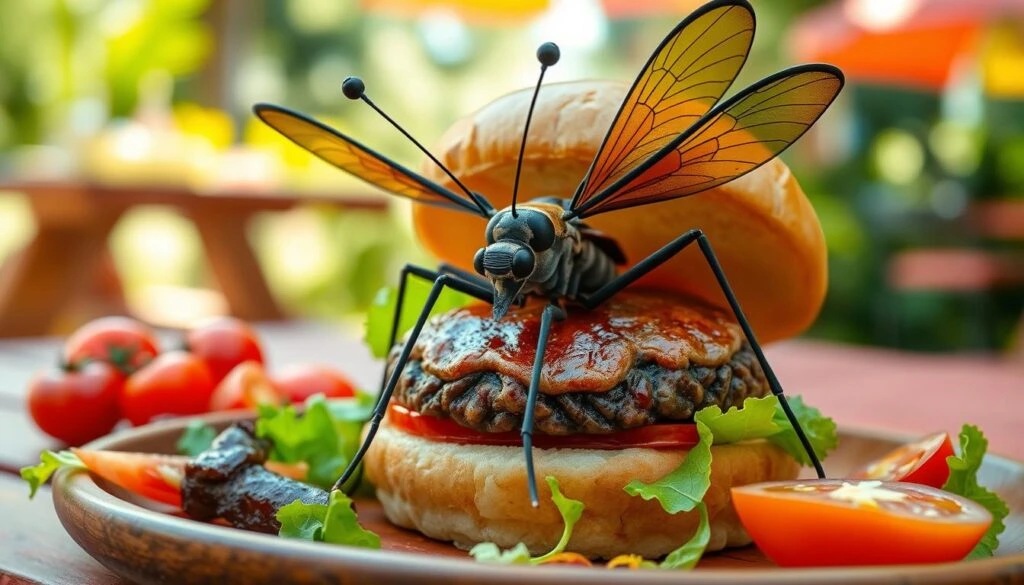When looking for new protein sources, you might have heard of mosquito burgers. This idea uses mosquitoes as food. It’s seen as a way to fight diseases since mosquitoes spread many illnesses.
In places like Africa, people are trying out mosquito burgers. They aim to tackle diseases carried by mosquitoes. This might sound strange, but it’s a real effort to solve a big health problem.
Table of Contents
It’s becoming more popular as people look for different food options. Dr. Mohammed Ghorab says they could be good for our health. Exploring mosquitoes shows how they might help our planet and our food system.
Understanding Mosquito: An Introduction
Are mosquito burgers real? Yes, they are, and they could be a new protein source. This idea of using mosquitoes for food is getting more attention lately.
Dr. Mohammed Ghorab says mosquitoes can be food. This idea has been around for centuries in many cultures.
What Exactly Are Mosquitoes?
Mosquito burgers are made from mosquitoes. They are high in protein and could be a green alternative to meat.
History Behind Their Creation
The story of the mosquito is interesting. Many cultures have used insects as food for a long time. In some places, insects are even a favorite dish.
Cultural Context and Necessity
Mosquito burgers fit into certain cultures well. In some countries, eating insects is common. Mosquitoes are seen as a good, easy choice.

Here is a table summarizing the nutritional value of mosquito burgers:
| Nutrient | Amount per serving |
|---|---|
| Protein | 20g |
| Fat | 10g |
| Carbohydrates | 5g |
In conclusion, mosquito burgers are a real, innovative food. They offer a green option for protein and could help with food security. So, they are definitely worth looking into.
The Origin Story in Africa
Exploring mosquito burgers leads us to their roots in Africa. These burgers, made from mosquito patties, are seen as a unique and green food option. Dr. Mohammed Ghorab notes that they could help prevent diseases in Africa.
In places like Malawi, mosquito burgers are a part of local cuisine. They are made from certain insects, turned into patties. These mosquitoes are not the usual kind but are more like flies. People near Lake Victoria see mosquitoes as a common food during some seasons.

Mosquito burgers are packed with nutrients and support green food systems. For instance, Tembiluk worms, used in some dishes, have lots of carbs, protein, and fat. Even though they’re not common, they bring people together to support sustainable food.
Here are some key facts about mosquito burgers:
- Mosquito burgers are made from a type of mosquito patty
- They are a traditional food source in some African countries
- They offer a unique opportunity for sustainable food systems
How Mosquito Burgers Are Made
Are mosquito burgers real? To answer this, we need to look at how they’re made. Making mosquito burgers involves several steps, from catching them to cooking. Catching mosquitoes can be hard and takes a lot of time.
Preparing mosquito burgers is like making regular burgers, but with a special protein. This protein is full of nutrients and can be very good for you. To make these burgers, mosquitoes are cleaned and mixed with other ingredients to improve taste and texture.
There are different ways to cook mosquito burgers, like grilling or frying. It’s important to cook them right to keep them safe and tasty. Some recipes might add spices or herbs to make the burgers taste even better.
- Mosquito burger protein is a rich source of nutrients
- The collection process can be challenging and time-consuming
- Preparation methods are similar to those of traditional burgers
- Cooking techniques can vary, but grilling and frying are common
| Ingredient | Quantity | Preparation Method |
|---|---|---|
| Mosquitoes | 1 cup | Harvested and cleaned |
| Spices | 1 tablespoon | Mixed with mosquito burger protein |
| Herbs | 1 teaspoon | Added to enhance flavor |
Nutritional Value and Health Considerations
Looking into the nutritional value of mosquito burgers is key. They are made from mosquito patties and are a green alternative to meat. With the world’s population set to hit 10 billion by 2050, finding new food sources is vital.
Some of the key benefits of mosquito burgers include:
- High protein content, comparable to beef
- Rich in essential fatty acids, vitamins, and minerals
- Promote gut health due to unique prebiotic fibers like chitin
When it comes to health, mosquito burgers can help fight malnutrition. They can fill gaps in iron, zinc, and vitamin B12. But, they might cause allergic reactions similar to shellfish allergies. So, it’s important to know about allergens before trying them.
Understanding the nutritional value and health aspects of mosquito burgers helps you make better food choices. With the need for sustainable food growing, mosquito burgers and patties are worth exploring.
Cultural Significance and Local Acceptance
Exploring mosquito burgers reveals their cultural importance and acceptance. In some African communities, mosquitoes are seen as a protein-rich food. This idea might seem strange, but it’s a common practice for many.
Dr. Mohammed Ghorab points out that African locals have used mosquitoes as food. This shows the cultural value of mosquito burgers. So, are mosquito burgers real? Yes, they are, and people eat them worldwide.
The cultural meaning is complex. Different communities have different views on using them as food. Some see them as a sustainable choice, while others doubt their safety and taste.
Here are some key points to consider about the cultural significance:
- Mosquitoes are a rich source of protein, making them a viable food option for many communities.
- The cultural significance of mosquito burgers varies across different communities and regions.
- Some people view mosquito burgers as a sustainable food source, while others are concerned about their safety and taste.
| Community | Perspective |
|---|---|
| African communities | View mosquitoes as a viable food source, rich in protein |
| Other communities | May be skeptical about the safety and taste of mosquito burgers |
In conclusion, the cultural significance and local acceptance of mosquito burgers are complex. While some communities see them as a sustainable food, others worry about their safety and taste.
Environmental Impact and Sustainability
The world’s population is expected to hit 9.7 billion by 2050. This makes finding sustainable food sources more crucial than ever. Mosquito burgers and patties can help lessen the environmental harm caused by raising livestock. Dr. Mohammed Ghorab points out that using mosquitoes can also help prevent diseases, adding to their ecological benefits.
Making mosquito burgers needs much less land, water, and food than raising animals. This means less greenhouse gas emissions, making them a greener choice. Some key advantages of mosquito burgers include:
- Lower greenhouse gas emissions
- Reduced water consumption
- Less land required for production
It also offers a high-quality protein, vital for our health. The edible insects market is set to hit USD 5.5 billion by 2026. This shows the big potential for mosquito burgers to become a common food item.
Mosquitoes are a great choice for those wanting to eat more sustainably. As more people seek out eco-friendly food, the role of mosquito burgers in the food industry will grow.
| Food Source | Greenhouse Gas Emissions | Water Consumption | Land Required |
|---|---|---|---|
| Mosquito Burgers | Low | Low | Low |
| Traditional Livestock | High | High | High |
Common Misconceptions About Mosquito Burgers
Many people wonder if mosquito burgers are real. The answer is yes, and they are packed with protein. Despite their benefits, some are hesitant to try them because of safety and nutritional concerns.
Some think mosquito burgers are unclean or unhealthy. But, when made right, they can be nutritious and good for the planet. It’s important to know the truth about mosquito burgers. For example, mosquitoes thrive in humid environments, making them a good food source in some places.
Here are a few key points to consider:
- Mosquitoes are a rich source of protein and can be a sustainable food source.
- Mosquito burgers can be prepared in a variety of ways, making them a versatile food option.
- When prepared properly, mosquito burgers can be a nutritious and healthy addition to a balanced diet.
By looking at the facts and separating myth from reality, you can make an informed decision about whether mosquito burgers are right for you. With their potential benefits and versatility, it’s worth considering the role that mosquito burger protein can play in your diet.
Global Reactions and Media Coverage
As mosquitoes get more attention, reactions worldwide are mixed. Some countries are interested, while others have concerns. The press has covered it, talking about both the good and bad sides.
The debate over mosquito patty as a food source is growing. Some see it as a way to lessen the harm of traditional farming. Others doubt its safety and taste.
Studies show the market for new protein sources is expanding. People want options that are better for the planet. Mosquito burgers could be a green alternative to regular meat.
Here are some key points to consider:
- Mosquito burgers could provide a sustainable food source, reducing the environmental impact of traditional livestock farming.
- The safety and palatability of mosquito patty are still being debated.
- The global market for alternative protein sources is growing, with many consumers seeking more sustainable options.
| Country | Reaction |
|---|---|
| United States | Mixed, with some interest in sustainable food sources |
| Europe | Skeptical, with concerns about safety and palatability |
| Asia | Interested, with some countries already exploring insect-based food sources |
Reactions vary globally, showing different views on culture and the environment. As it gets more attention, we need to tackle concerns and look at its benefits.
Similar Insect-Based Foods Around the World
Are you curious about mosquito burger protein? You’re not alone. Many cultures around the world use insects as a protein source. Yes, mosquito burgers are real, but they’re not the only option.
Dr. Mohammed Ghorab talks about foods like cockroach bread and locusts. These are seen as sustainable protein alternatives. With over 2,000 edible insects, the variety is vast. You can find everything from cricket-based pasta to snacks.
Crickets need much less food than cattle to produce protein. This makes them a greener choice. As the world looks for more protein, insect-based foods are getting attention. Exploring mosquito burger protein? You’re part of a growing trend.
Future Potential of Mosquito-Based Foods
The world is looking for better ways to feed everyone. Burgers and patties might be part of the answer. Dr. Mohammed Ghorab says they could help fight diseases.
More people want food that’s good for the planet. The market for insect protein is set to boom. Mosquito-based foods could be a big part of this, helping the environment and farming.
Here’s why mosquito-based foods are good:
* They’re full of nutrients
* They’re kind to the planet
* They might help stop diseases
* They’re made in ways that are good for the earth
By 2050, we’ll need more food than ever. Mosquito burgers could help. They’re a green way to feed people and help the planet.
| Food Source | Greenhouse Gas Emissions | Land Use | Water Use |
|---|---|---|---|
| Mosquito-based foods | Low | Low | Low |
| Traditional livestock | High | High | High |
In short, burgers and patties are a bright spot for our food future. They could help us eat better, fight diseases, and save the planet.
Conclusion: Understanding the Role of Alternative Food Sources
Show how vital alternative food sources are for our planet. With the world’s population set to hit 9.7 billion by 2050, finding efficient and sustainable protein is key. The debate on whether mosquito burgers are real has turned into a reality, showing the creative ways we’re tackling food needs.
The move towards alternative proteins, like plant and insect-based ones, is fueled by health, environmental, and ethical concerns. These options use up to 75% less water and land than traditional animal proteins. As our population grows, so does the need for innovative food sources.
In summary, alternative food sources, play a big role in sustainable farming and cutting down on greenhouse gases. As we look for new ways to ensure food security, it’s important to see the value in alternative proteins. By adopting these options, we can help make food production both efficient and eco-friendly.

